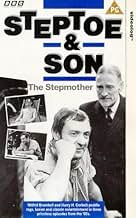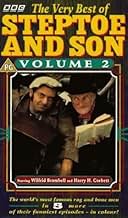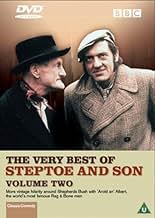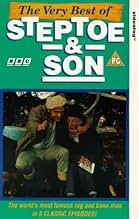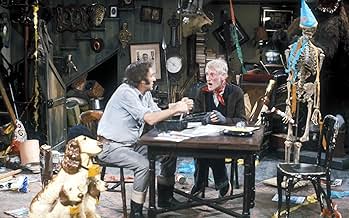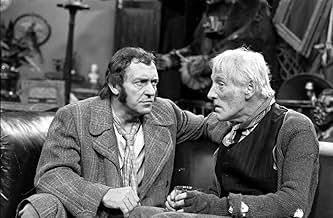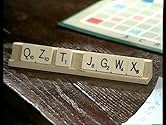IMDb RATING
7.8/10
3.6K
YOUR RATING
British sitcom about a father-and-son rag-and-bone business in London. The intergenerational divide between the miserly Steptoe and his ambitious son results in comedy, drama, and tragedy.British sitcom about a father-and-son rag-and-bone business in London. The intergenerational divide between the miserly Steptoe and his ambitious son results in comedy, drama, and tragedy.British sitcom about a father-and-son rag-and-bone business in London. The intergenerational divide between the miserly Steptoe and his ambitious son results in comedy, drama, and tragedy.
- Awards
- 2 wins total
Browse episodes
Featured reviews
I am an American who has only discovered the marvelous 'Steptoe & Son' British television series many years after it originally aired. I have managed to watch just about every episode that is available on you tube. I highly recommend this television classic. There were numerous episodes that made me want to cry. The death of their horse Hercules was virtually unbearable, as well as the one where Harold had Albert placed in a old folks' home. The love-hate relationship of the father and son junk company team is more intense than anything ever seen on American television. Although I feel very sorry for Harry being trapped in a world he never made, I find Albert the more appealing of the two. I also can understand the old man's accent more than the son's.
Although Steptoe and Son ran on British TV for twelve years it is one of those rare (maybe unique) examples of an idea which continued to develop and evolve rather than slide into stale repetition.
In its early years the series emphasised broad comedy. One well-remembered episode features Albert eating a meal while sitting in his bath, earning a rebuke from his son which became a national catchphrase: "You dirty old man!"
As time went by the characters became established and the writing began to emphasise the mutual dependency of two basically lonely men (Harold the batchelor and Albert the widower). Harold dreams of a better quality of life away from his father and constantly makes attempts to achieve something in his own right. His attempts are thwarted by his own lack of social standing and his father's scheming: if Harold joins a local theatre group, Albert joins too and becomes the star of the show.
Albert, for his part, fears losing his son and being abandoned in his old age. He will use any means (especially moral blackmail) to keep Harold at his side. More importantly he is far more realistic than Harold and sees that his attempts at social ambition are doomed.
In one of the most moving episodes an old girlfriend of Harold's reappears after many years. They still feel the same way about each other and plan to marry. Finally Harold can break away from the old man. Naturally Albert has other ideas, but at the climax of the show it is the girl who ends the relationship, telling Harold he is already married.
The performances of Wilfrid Brambell and Harry H Corbett never faltered through the show's run. Galton and Simpson produced scripts of wit and insight and they performed with great skill and subtlety. This is a show where you laugh while recognising the truth and basic sadness of the situation in which the characters live.
In its early years the series emphasised broad comedy. One well-remembered episode features Albert eating a meal while sitting in his bath, earning a rebuke from his son which became a national catchphrase: "You dirty old man!"
As time went by the characters became established and the writing began to emphasise the mutual dependency of two basically lonely men (Harold the batchelor and Albert the widower). Harold dreams of a better quality of life away from his father and constantly makes attempts to achieve something in his own right. His attempts are thwarted by his own lack of social standing and his father's scheming: if Harold joins a local theatre group, Albert joins too and becomes the star of the show.
Albert, for his part, fears losing his son and being abandoned in his old age. He will use any means (especially moral blackmail) to keep Harold at his side. More importantly he is far more realistic than Harold and sees that his attempts at social ambition are doomed.
In one of the most moving episodes an old girlfriend of Harold's reappears after many years. They still feel the same way about each other and plan to marry. Finally Harold can break away from the old man. Naturally Albert has other ideas, but at the climax of the show it is the girl who ends the relationship, telling Harold he is already married.
The performances of Wilfrid Brambell and Harry H Corbett never faltered through the show's run. Galton and Simpson produced scripts of wit and insight and they performed with great skill and subtlety. This is a show where you laugh while recognising the truth and basic sadness of the situation in which the characters live.
A brilliant exercise in British comedy from the sixties and seventies ! Not one episode fails to please and the dialogues were extremely savoury. A certain number of episodes are available on BBC dvds in the UK region 2. The picture quality of the latter episodes is so good that you'd swear they'd been made yesterday. It is hard to believe that both of these characters have sadly left us but thanks to this series they will live on forever in our hearts and minds ! It appears that in real life, Wilfred Brambell was an exceedingly well-spoken man and didn't have a common accent at all. In one of the episodes involving Harold acting in a play, we do in fact hear Albert speak in a very posh voice albeit very briefly.
One of the saddest sights I ever saw on television was Wilfrid Brambell, close to tears on 'Nationwide' in 1982 following the sudden death of his 'Steptoe & Son' co-star Harry H.Corbett. The pairing of these great actors, combined with some wonderful scripts by Ray Galton and Alan Simpson, made 'Steptoe' a classic. I think viewers recognised the truthfulness of the situation; rag and bone man Harold desperately wanted to escape from his father's domination to begin a new life on his own, but couldn't because he loved the old man too much. When searching for comedy ideas, today's writers fall into the trap of thinking: "How can I shock the public?". 'Steptoe' did not set out to shock, yet did because it was so real. After a successful run in the '60's, it was revived in the '70's in colour, and these episodes are my favourites, particularly 'Divided We Stand' in which Harold and Albert tried to lead separate lives in the same house. The word 'timeless' is overused these days, but it definitely applies here.
Steptoe and Son is probably the best British comedy ever. Featuring late stars, Wilfred Brambell and Harry H Corbett, this was an excellent show which never failed to amuse me and was true to life.
The show featured pensioner Albert Steptoe and his son Harold Steptoe (a pair of rag and bone men). They bickered, the fought, they sulked and generally got on each other's nerves. But underneath, there was a mutual love.
This show kind of reminded me of my own life. Even though I love my own dad, I did spend quite a few years of my life arguing with him even when I left home at 18. We were two different people with different outlooks on life and this led to some battles at times. This show was the same. Albert and Harold could not have been more different. Harold was fed up with his dad's filthy habits and moaning; Albert was always playing on Harold's emotions with phrases such as, "I'm an old man Harold. Need looking after." Also funny was the fact that Albert always ruined any prospective relationship that Harold was going to engage in. But they loved each other deep down and that was the fun of it.
Truly the greatest British comedy ever.
The show featured pensioner Albert Steptoe and his son Harold Steptoe (a pair of rag and bone men). They bickered, the fought, they sulked and generally got on each other's nerves. But underneath, there was a mutual love.
This show kind of reminded me of my own life. Even though I love my own dad, I did spend quite a few years of my life arguing with him even when I left home at 18. We were two different people with different outlooks on life and this led to some battles at times. This show was the same. Albert and Harold could not have been more different. Harold was fed up with his dad's filthy habits and moaning; Albert was always playing on Harold's emotions with phrases such as, "I'm an old man Harold. Need looking after." Also funny was the fact that Albert always ruined any prospective relationship that Harold was going to engage in. But they loved each other deep down and that was the fun of it.
Truly the greatest British comedy ever.
Did you know
- TriviaWilfrid Brambell was only 49 when he began playing Albert Steptoe, who was supposed to be 63 when the series began.
- GoofsThe physical positioning of the Steptoe's outside toilet varies over the course of the series: sometimes it is plumbed in facing the yard gates, at other times it's rotated to face the wall.
- Quotes
[repeated line]
Harold Steptoe: You dirty old man!
- ConnectionsAlternate-language version of Stiefbeen en zoon (1963)
Details
- Runtime45 minutes
- Color
- Sound mix
- Aspect ratio
- 1.33 : 1
Contribute to this page
Suggest an edit or add missing content


